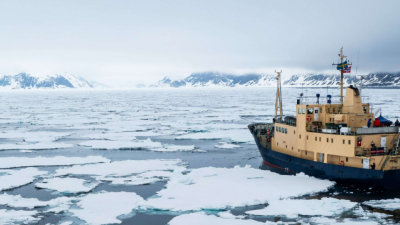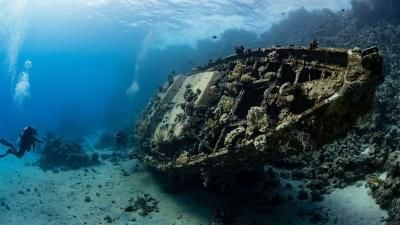
Arctic Maritime Safety: learning from the past to address today’s challenges
Lloyd's Register Foundation is pleased to announce a new grant of £500,000 providing fellowship funding to the University of the Arctic (UArctic).
This page is approximately a 3 minute read
This page was published on

Green Seas: A podcast by TradeWinds
Across the world, more than 8,000 of the shipwrecks left by two world wars still contain vast amounts of oil – estimated to be as much as 20 million tonnes. They have the potential to cause devastating safety and pollution events in our oceans, threatening ecosystems, coastal industries, and communities.
Benjamin Ferrari, Senior Advisor to Lloyd’s Register Foundation and Louise Sanger, Head of Research, Interpretation & Engagement, join Green Seas, a podcast by Trade Winds to examine why understanding this safety issue is so important, and discuss Foundation initiatives that are driving change in this area - with insights from The Ocean Foundation’s Senior Advisor on Ocean Heritage, Ole Varmer.
“This is a globally distributed challenge” commented Ben, with a significant number of coastal states hosting potentially polluting wrecks, and many more unaccounted for due to a lack of comprehensive data on location and condition. “For many years, these wrecks have been slowly leaking oil but the survey data we do have is telling us that hull structures weakened by age are now beginning to collapse. They are increasingly vulnerable to impacts such as storm surges and unregulated salvage – chronic leakage will develop into catastrophic release of large quantities of oil.”
Globally, we are entering a period of severely heightened risk with a near certainty of pollution events. Awareness raising and local capacity building are essential to help mitigate the effects of these wrecks. Lloyd’s Register Foundation is building a global coalition of experts to create technical standards and engage international bodies to enable a more strategic response to the challenge. Yet working to engineer a safer ocean is only one element of a multi-dimensional problem. Some of these hazardous wrecks also act as artificial reefs and enhance local biodiversity, often contributing to the eco-tourism economy. Many are designated as of historic value and as war graves.
Louise explains how the recently digitised records at the Lloyd’s Register Foundation Heritage Centre, now available online, have already been used to identify 129 previously unknown or mis-identified wrecks.
“It’s a problem that can’t be solved by one country. It needs to be tackled at a global level,” says Louise. By convening multilateral stakeholders, we can share the latest evidence and insight, technical solutions, archival knowledge and encourage discussion on essential financial mechanisms. The Foundation’s Heritage Centre is forging new partnerships to make the collection even more useful – for example by collaborating with a major new European Research Council programme investigating how wrecks deteriorate over time.
“We need a systematic approach to identify where the most volatile wrecks are. There is urgency in thinking about the financial costs of responding,” says Louise. At present, incomplete data on location and condition, combined with complex governance issues, have resulted in the need for high cost ‘emergency response’ work rather than planned interventions.
Moving towards a more strategic and proactive approach, with widely accepted standards will make it easier for multilateral agencies to encourage action and strengthen advocacy concerning the use of financial resources by providing transparency and assurance. “Taking action now, is the sensible thing to do” explains Ben.